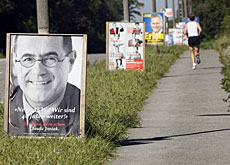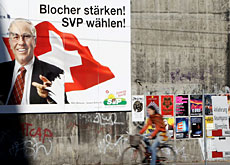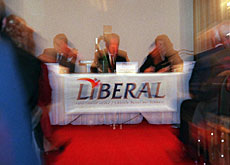Donors provide main income source for parties

Political parties are increasingly relying on donations while funding through their members has been on the decrease, according to a study by Lausanne University.
However researchers warn that statistics of party financing are of limited relevance, as there is no transparency in political funding and different accounting systems are applied.
The trend towards financing through donations is most marked with the rightwing Swiss People’s Party and the centre-left Social Democrats, the authors of the study said on Monday.
“The donations contributed to a large degree to the bigger role of the media in the election campaign,” they concluded.
The five main political parties had a total of SFr16.5 million ($16 million) at their disposal in 2006, up 60 per cent on 1996.
The report by the University of Lausanne’s Graduate School of Public Administration also says none of the parties raked in more than 40 per cent of their funding – a record low – through member fees.
On average the percentage of external funding rose from 57 per cent in 1996 to 71 per cent ten years on.
The centre-right Radical Party, which traditionally has close ties with the business community, received 94 per cent of its revenue through donations, according to the report.
The People’s Party – the biggest of the five main parties in parliament – as well as the centre-right Christian Democrats came second with 75 per cent of donations ahead of the Social Democrats and the Greens with 62 per cent and 60 per cent respectively.
No transparency
The researchers are cautious about precise data for party funding as the different groups use different accounting systems.
In addition, political parties do not benefit from public funding. The latest proposal for more transparency was rejected by the parliament’s House of Representatives last September.
The parties are known to finance their campaigns with donations and other contributions, notably by companies and prominent party members.
Mathieu Gunzinger of the Graduate School is also sceptical of the SFr20 million budget for the five main parties for the 2007 election year, an increase of 87 per cent on the previous year.
He pointed out that the market research institute Media Focus put the cost for advertisement alone at SFr65 million in 2007. The People’s Party, one of the main winners of the election, alone apparently had SFr26.4 million at its disposal.
Gunzinger pointed out that the discrepancies between budgets and spending was typical of the increasing percentage of donations.
The changes in the financing structure are also having a negative impact on the powerful cantonal party chapters in the federalist system.
The cantonal chapters saw their revenue drop slightly to SFr32.6 million in the period 2004 to 2007 compared with the period 1994 to 1997.
Gunzinger says the different funding channels could impair the credibility of a party and confuse voters.
“It could become problematic as the national parities and the cantonal chapters could feel obliged to defend different interests.”
In Britain, parties do not receive any direct state funding for the election campaign. Each party is allocated time on all TV channels simultaneously, an allocation that reflects their size in parliament. There are limits on campaign expenditure by each candidate but not by the party.
In Canada, candidates and parties have their election expenses partially reimbursed. Any candidate who receives at least ten per cent of the vote gets 60 per cent of election and personal expenses. Any political party that receives two per cent of the national vote can receive half of its election expenses.
Australian political parties are funded for federal elections depending on their electoral popularity. Expenses are reimbursed depending on vote share. The total amount is set by parliament and allocated by the Australian Electoral Commission.
In the US, qualified presidential candidates receive federal funds to pay for campaign expenses in both the primary and general elections. To qualify for public funding, candidates must meet requirements such as agreeing to limit campaign spending to a specified amount.

In compliance with the JTI standards
More: SWI swissinfo.ch certified by the Journalism Trust Initiative




You can find an overview of ongoing debates with our journalists here. Please join us!
If you want to start a conversation about a topic raised in this article or want to report factual errors, email us at english@swissinfo.ch.